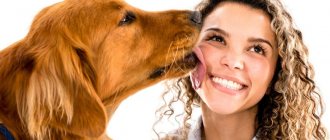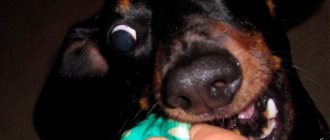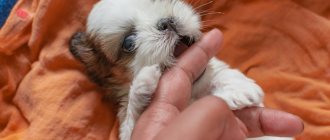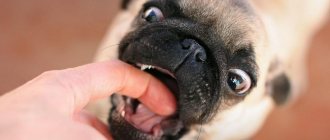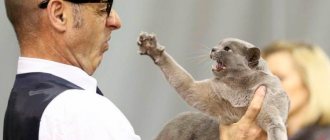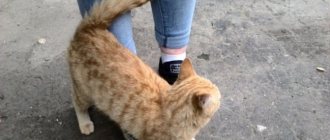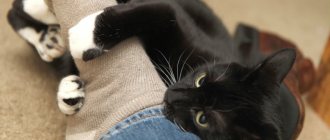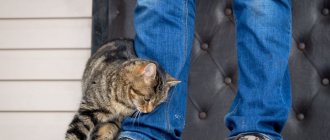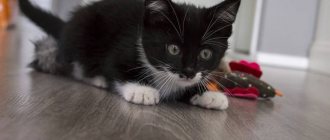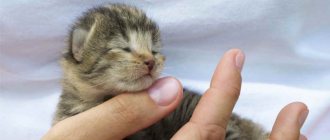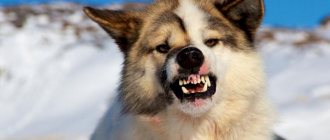While observing my dog, I noticed that one of the many things he does every day with great fervor is lick his feet. Is this a cause for concern?
Ah, our four-legged friends. They often do things that irritate us many times. This could be licking the floor, eating scraps of food, or simply licking our feet or hands. However, we forget that dogs try to communicate with us through actions.
Understanding why your dog does what he does is critical to keeping your dog connected, healthy, and well-being. That's what a friend is for! To help.
I have come across people who complain about their dogs licking the feet of their owners or strangers. A person might be ticklish, okay, that might be an understandable reason why we don't like it. The dog is definitely not doing this to tickle us.
© shutterstock
Remember, you should never yell or hit an animal to stop an activity that the four-legged animal is performing. If your dog has a habit of licking his feet, it is worth looking into the problem and approaching it with patience and kindness. There can be many reasons for this behavior, and therefore we cannot ask the dog “what are you doing?” we can only guess. Each dog may approach foot licking differently.
Reaction to inappropriate behavior
Licking a dog's feet can be enjoyable or very annoying, so each owner decides for himself how to react to such strange behavior of the pet:
- In order for your pet to understand that his actions are unpleasant, you need to carefully say the word “no” and remove him from your legs. This removal procedure is done regularly.
- Perhaps the animal is demonstrating its love for its owner, so you shouldn’t swear at it, much less beat it. You need to figure out why a dog licks its feet, since such actions occur instinctively. If she is punished for this, she may not even understand why the owner did it.
If your concern about your pet licking his feet persists, you need to consider all the possible reasons for the behavior. If necessary, you should seek help from a dog psychologist. Perhaps your four-legged friend suffers from neurosis.
Expression of love and devotion
Some believe that a dog licks its owner, thus expressing its emotional state, love and devotion. After all, just like us, animals experience different emotions.
And if in an aggressive state a dog can growl and even bite, then in a state of good mood, by licking you, your pet shows how happy and devoted he is to you. By the way, you might be interested in reading about how to stop a dog from biting.
Is it bad for a dog to lick its feet?
In most cases there is no problem with this. However, if she does this constantly, she may be worried about something. She may be worried and need your help. If you just moved into a new home or brought home another pet or someone new, your dog may start to feel stressed and lick their feet more often. Over time, she should adjust to the new shift, but you can always give her her favorite toys, cuddle her as much as possible, and leave her a comfortable bed to sleep in when you're not home to help her feel better.
It is not healthy for your dog to lick your feet if you have any chemicals on your feet , such as from lotion or medications. Let's say you have a mosquito bite on your legs and you apply anti-itch cream to it. The ingredients in it may be harmful to dogs. If your dog licks your feet and then starts vomiting or vomiting, or has diarrhea, then you should take him to the vet immediately.
Additionally, you may simply not like it when your dog licks your feet. If this is the case, ignore your dog (or even walk away) when he licks your feet, and reward him with treats and praise when he is at your feet but not licking them. You can also redirect him by giving him something that is appropriate to lick, such as a Kong full of treats or peanut butter. (Just make sure the peanut butter doesn't contain xylitol, which is toxic to dogs.)
Why do dogs lick people?
However, dogs can lick not only their owner, but also strangers. This happens for several reasons.
Why do dogs lick people?
- They are collecting information. Each person has a certain smell, the dog gets to know its owner by licking the surface of the skin.
- The dog tries to mark the person so that during further communication he can understand that this is a familiar person.
- The dog is nervous. Usually in crowded places where there are a large number of strangers, the dog licks not the strangers at all, but the owner. The pet is worried because the owner may forget about him surrounded by so many quality people. In this case, a kiss is a way to attract attention. It’s as if he’s saying: don’t forget about me, I’m still here.
With a dog
Why does a puppy lick its owner?
There are several reasons why doggies do this. The ability to lick appears in dogs from birth. It is after birth that the mother licks her puppy, removing traces of mucus, blood, and stimulating intestinal function. It is believed that at birth, dogs’ intestines are not filled with the necessary enzymes to break down food; babies have virtually no immunity. By licking her babies, the mother transfers part of her saliva, along with protective functions, to the puppy's fur. Many people believe that this is a kind of declaration of love and an alternative to kissing, but in reality this is not the case. Below we will look at several reasons why a puppy may lick its owner.
Why does a puppy lick its owner?
- At an early age, puppies cannot defecate on their own, so they need a kind of massage. It is for this purpose that mothers lick their babies. If you look closely, the kids often reciprocate her feelings. But this is not at all an indicator or a declaration of love. Small pets try to attract attention, ask for food, affection. “Kiss” makes it clear that he needs attention and care from his mother.
- A way to get attention. Most often this happens early in the morning; the dog may approach the sleepy owner and lick his fingers. The dog wants attention, is hungry, and needs a walk.
- I like your smell. It can occur after a meal when the dog owner has consumed meat products, such as cutlets or sausage. The dog likes such smells, he can lick and beg the owner for a treat.
- This happens if the dog is not given such products due to possible problems with the gastrointestinal tract.
Kisses
Demodex mites and scabies
Mites can live on an animal's skin, causing hair loss, crusting, inflammation and itching that causes licking.
There are two types of mites: the demodex mite, which lives deep in the hair follicle, and the scabies mite, which lives on the surface of the skin. Both can cause hair loss, redness, and bacterial infection of the skin.
Demodex mites located on the feet may indicate the presence of an underlying disease, such as Cushing's disease or cancer, that suppresses the immune system.
Ticks can be treated with topical or oral medications. Oral medications used to treat demodex mites (NexGard, Bravecto) and scabies (ivermectin) are available by prescription only.
Lime-sulfur sauces for scabies mites can be purchased over the counter, but they have an unpleasant sulfur odor and may stain animals or light-haired surfaces. Their use should also be supervised by a veterinarian.
Means for melting snow and ice
Winter snow and salt used to remove ice can also cause skin irritation, causing your dog to lick his paws. Extreme cold and irritation from salt can cause the affected areas to become red. Contact your veterinarian if you suspect your pet's paws are irritated by snow or deicer.
Using boots when walking in winter will help avoid this. You can also use paw wax or dog-safe de-icers for your own yard.
Why does a dog lick its owner's hands?
The dog is nervous and worried. Often, pets may lick their owners' hands before they leave.
Why does a dog lick its owner's hands?
- Dogs very quickly remember rituals and repeated events. If the owner, after waking up, brushes his teeth, makes coffee, and bangs his keys, this indicates he is leaving for work. This causes anxiety for the pet, because he understands that he will have to be alone for a long period of time. The dog begs for attention from the owner, enjoys the last minutes of being with the owner, or tries to beg him to stay at home.
- Dogs are pack animals that are used to living in a hierarchical society. In such a pack there are leaders and subordinates. That is why dogs very often lick the hands of their owners, thereby they show their submission, considering the owner to be the leader of the pack.
- This is especially important if this dog is of a dominant character, for example, a Jack Russell Terrier. With such dogs there are many difficulties in the training process. With dogs of these breeds you need to be quite strict and constantly prove your superiority. The opposite situation happens: the dog licks the hands of its owner, considering him his friend, his equal.
With kids
Ownership issue
There is a version that a dog, by licking the back of a person’s palms in the presence of other people, wants to demonstrate its connection with this person. Or it seems to be laying claim to it. As if it shows “this person is mine, he is busy.” When other people are around the owner, the dog may begin to express its feelings even more actively. She shows that she has weight in this house and for this person.
With these actions, the animal tries to show everyone that it is allowed to invade where others are not allowed - into personal space. Like, “look, I can lick him, and he doesn’t chase me away.”
Palm licking
Is it okay to let your dog lick you?
Bad breath from your pet is not a problem. The problem is that dog saliva contains bacteria that can cause oral diseases in humans.
Don't let your pet lick your face; saliva contains a lot of bacteria.
This applies to all four-legged friends, both large ones like Alabai, Husky or German Shepherd, and representatives of small breeds - pug, chihuahua, Yorkie.
Cattails, just like people, have caries or inflammation.
They occur if the pet accidentally injures the gum with a bone or dry food.
Most often, a person does not even suspect that his pet suffers from an oral disease, since it occurs without obvious symptoms. Studies have shown that 70% of pet watchdogs suffer from periodontitis or periodontal disease.
A person can also “reward” a dog with pathogenic bacteria.
Experts say that people who prohibit excessive tenderness from their tails have much less harmful bacteria in their mouths.
Licking feet
To show a special relationship with the owner, the dog begins to lick the feet, since this is the most accessible part of the body. Frequent licking of feet occurs for many reasons. The main ones:
- Unpleasant smell. In its natural habitat, the animal is detected by its strong smell. The instinct inherent in nature forces the pet to lick the owner’s feet so that it is not discovered by the enemy.
- Wounds. The four-legged “doctor” cannot ignore the wounds and scratches on his legs. With his own saliva he helps to heal a person’s illness.
- Lack of hydrochloric acid. In order for an animal’s stomach to function well, it requires hydrochloric acid, which is produced due to sodium and chlorine entering the body. The pet tries to make up for the lack of substances by licking the sweat accumulated on the legs.
- Fear. If the relationship between a person and a dog is bad, the pet timidly tries to touch the owner with its tongue. This often happens if the owner is aggressive towards the pet. In this case, you need to completely reconsider your behavior towards him.
The dog shows some of its feelings by barking or growling, and with the help of dog kisses they demonstrate friendliness and care. To establish a connection with the owner, to show him her devotion and love, she begins to lick her lips.
Briefly about the main thing
- Dogs lick people as a sign of deep respect and admiration.
- The licking instinct is passed on to puppies from their mother and helps identify pack members.
- If a dog licks you lightly when meeting you, this is a sign that it wants to remember you better.
- Dog saliva contains lysozyme, a substance that kills bacteria. Licked wounds in dogs heal much faster.
- If your dog is licking you, the floor, or toys uncontrollably, consult a professional. In the absence of pathologies, spend more time walking and playing with your pet.
Have you noticed such habits in your pets? Were you able to read them correctly? We invite our dear readers to share their life experiences.
Did you like the article? Share it with your friends on social media. networks. This will help them get useful information and support our project.
Health problems and licking of front or back paws
The first step is to determine if there are any paw health problems. Dogs may lick their front or back paws excessively if they are itchy, irritated, or painful.
Damage to the paw or the presence of a stuck foreign object can explain the sudden manifestation of changes in behavior, expressed in paw licking. The dog may have stepped on something causing discomfort. For example, a sharp object or hot pavement. The animal may have been bitten by an insect or other animal. Or is it simply an object or substance stuck or stuck to the paws that requires human help to remove it. Foreign objects such as splinters and pieces of plants can get stuck in the paws and cause irritation.
Another possibility is that the dog has a mass on one of its paws, like a cyst or tumor. Or the dog has arthritis, injury to the soft tissue or bones of the paw. The latter cannot be seen with the naked eye.
A paw injury, foreign object, or swelling is most likely if a dog focuses on one paw more than the others. However, these problems can affect more than one limb at a time.
Allergies often cause the paw pads to become itchy or irritated, causing the dog to lick them excessively. Many dogs have food and/or environmental allergies that cause discomfort in their limbs. Food allergies most often cause itchy paws.
Infections also cause dogs to lick their paws. Many individuals develop bacterial or fungal infections of their paws. These infections can occur for a variety of reasons. However, sometimes they are secondary to allergies. When a dog licks his paws excessively, they remain wet and are more susceptible to bacteria and fungal spores. External parasitic infections, such as fleas or mange, can also cause itchy paws, leading to excessive licking.
If there is no physical reason for your dog to lick his paws excessively, it is acceptable that your dog has behavioral problems.
Lack of attention
On a dark night, an unsuspecting owner is awakened by the licking of an agitated pet - this is a clear sign of lack of attention. A pet will not wake up a person just like that; most likely, the animal is stressed and resorts to licking as a last resort to attract attention - “Even if I am scolded, they will pay attention to me.” So, if attacks of tenderness occur at the most inopportune moment, think about it: perhaps the dog is suffering from loneliness.
Main reasons
There are many clear reasons why dogs love to lick their feet. Although this behavior seems strange to a person, it can mean a lot to an animal. Main factors:
- Showing love. The animal is very happy, wags its tail, tries to jump up and lick the person in the face. This behavior is accompanied by puppy-like yelps.
- Lack of attention. To attract attention when the owner is sleeping or quietly watching TV, the dog tries to lick him.
- The period of education. When a small puppy under 6 months of age is constantly petted, cuddled and rewarded with treats, he begins to get used to it and turns into a sucker. It will be difficult to break an adult dog from such a habit.
- Stress. If a four-legged friend climbs into the owner’s bed at night, licks his face and whines at the same time, it means that something has scared him. This behavior is often observed during a thunderstorm or when the dog hears a siren.
- Personal motives. The pet enjoys the process of licking itself. He licks his face, hands or one finger and gets great pleasure from it. This is how the animal asserts itself. To prevent him from developing a complex, he cannot be forbidden to do this.
- Wrong diet. The puppy receives all vitamins and microelements from its mother’s milk. When switching to a nutritious diet, he may lack calcium. Trying to replenish this microelement, he begins to lick the person.
- Remembering the owner. To remember its owner, the puppy needs to be in close contact with him. Recognition occurs both by smell and taste, so babies constantly lick their hands and face.
- Purity. A dog smells many odors, most of which humans cannot even smell. Some of them are very attractive to the animal, others are unpleasant. To get rid of the bad aroma emanating from the owner, the dog licks it.
- Fearfulness. After punishment, you can see a picture of a dog tucking its tail, sinking to the floor and crawling towards its owner to ask for forgiveness. At this moment she tries to timidly lick.
- Wound healing. Dog saliva contains special enzymes that have antibacterial properties. If you let your dog lick the wound, it will heal faster.
- Label. To show other individuals that a person is in the pack, the dog leaves its scent mark by licking the person’s hand.
Licking is the main expression of feelings in pets. From the first days of life, the female licks her cubs, thus caring for them. Strange animals will not smell the puppies, as the mother's scent remains on them. To improve the babies' digestion, the mother licks their bellies. Teaches to move - by licking the paws and back. Teaches them trust and care. The puppy receives all its basic instincts from its mother, and the owner cannot completely remove them.
Solution
If the animal’s strange behavior begins to bother you or you don’t like it at all, you need to try to distract it with something so that it forgets about its owner’s legs. This can be done in the following ways:
- Put socks on your feet.
- Then they play with the four-legged friend or pick him up and talk.
- You need to give him a toy to distract him.
- Walking outside should be active with fairly strong physical activity. Having received many new impressions, he will not bother his owner at home.
- You can try adding salt to your food or pouring salt into a small bowl that is placed next to the water. If the dog starts approaching the salt and licking it, it means that the mineral balance in his body is disturbed. The dog will stop licking its owner's feet once balance is restored.
- If the reason is hidden in loneliness, you need to communicate more often with your four-legged friend. If you don’t have enough time, you can buy a cat, hamster or other pet so that the dog doesn’t feel so lonely.
- Animals cannot tolerate strong odors, especially citrus fruits. It will be unpleasant for them to lick their owner if their face and hands are smeared with these odors.
Dog handlers believe that a dog must be trained from childhood, then unwanted behavior can be avoided. Through training, the pet is prohibited from licking the legs and arms of a person. The final result depends on how much the dog remembers the commands and follows them clearly. For example, you can scare away a pet who is about to show his affection with a loud and sharp sound, clapping your hands. This is done until he understands that he cannot lick the owner.
The basic instincts of animals did not disappear after they began to live next to humans . They mistake a person for a member of their pack. In this regard, owners must carefully examine each dog's affection and find out about the reasons for its manifestation. This will help correct behavior problems in a timely manner.
In someone else's skin
To be able to recognize the essential elements of an animal's umwelt is, in essence, to become an expert on ticks, dogs, people, and so on. This is how we can close the gap between what we think we know about dogs and what they really are.
We can try to assimilate the umwelt of another animal, to incarnate into the animal (bearing in mind the limitations imposed by our sensory system). It's an amazing thing to spend a day being as tall as a dog. Sniffing (even with our less-than-perfect noses) the objects we encounter throughout the day fundamentally changes the way we think about familiar things.
Now pay attention to the sounds in the room where you are - sounds that you are used to and that you do not usually listen to. So, with some effort, I hear the noise of a fan in the corner, the hum of a truck in the distance, the inaudible voices of people climbing the stairs; a wooden chair creaks under someone; my heart is beating; I swallow; The page rustles as it turns. If my hearing had been sharper, I might have heard the scratching of a pen on paper at the opposite end of the room, the sound of a flower growing and the insects talking under my feet. Perhaps other animals hear these sounds clearly.
